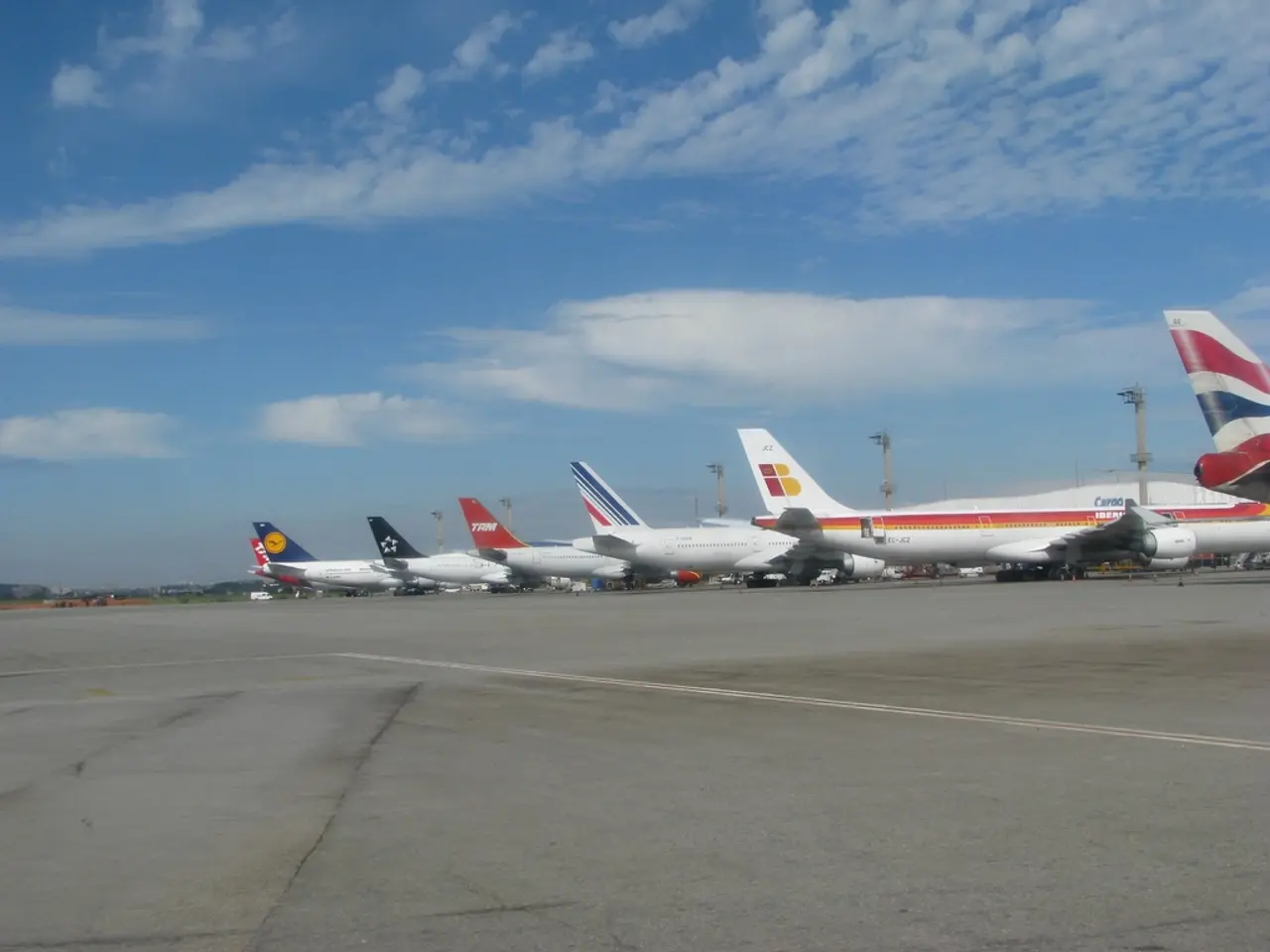Airbus is pushing the boundaries in the field of eco-friendly jet fuel production
In a significant step towards reducing carbon emissions, Airbus has significantly increased the use of Sustainable Aviation Fuel (SAF) in its operations. The company exceeded its initial 2023 target of 10% of total fuel usage across its divisions by more than a million litres, using over 11 million litres of SAF in total.
This marked increase in SAF usage is a testament to Airbus' commitment to decarbonisation and its partnerships with research institutions and suppliers to develop and source SAF derived from biomass and waste materials. In 2023, Airbus delivered more aircraft with SAF than any other year, and IndiGo was the first customer to take advantage of Airbus' offer of up to 5% pure SAF for a new A320neo delivery.
Airbus' partnerships extend beyond Europe and Japan, with collaborations in China, the Middle East, and South America. The company has signed a Memorandum of Understanding with China National Aviation Fuel (CNAF) to strengthen Chinese-European collaboration on SAF production and standard formulation. Airbus has also teamed up with Lanzajet to advance the building of SAF facilities and signed a Memorandum of Understanding with Masdar, an Abu Dhabi energy company, to further develop SAF production. In Australia, Airbus has made a significant contribution to the development of local SAF production through a partnership with Qantas and the Queensland Government.
Under the International Civil Aviation Organization (ICAO) ACT-SAF initiative, Airbus and ICAO signed a Declaration of Intent to assess South America's SAF feedstocks and production. This focus on global collaboration is essential, as the use of SAF by Airbus in 2023 accounted for 2% of all SAF produced in the world over the year.
Airbus Helicopters is also embracing SAF, with delivery flights routinely performed with SAF when available. The target for 2024 is almost half a million litres of neat SAF, and Airbus Helicopters is using SAF for development test flights and training in Marignane, France, and Donauwörth, Germany, and conducts demo flights with the H160.
The use of SAF by Airbus in 2023 contributed to the reduction of CO emissions by 23,587 tonnes. This is a significant step towards Airbus' goal of helping the industry meet its goal of 17.5 billion litres of SAF by 2030. Airbus partners with energy producers, airlines, and airports around the world to achieve this goal.
While Airbus recognises that SAF alone will not fully solve aviation's sustainability challenges, it remains a key component of decarbonization pathways supported by governments and regulatory frameworks. In addition to its focus on SAF, Airbus is also investing in engine efficiency and hybrid propulsion technologies as part of its broader sustainability strategies.
Looking ahead to 2024, Airbus' partnerships and research focus on scaling SAF production from biomass sources suggest a substantial ramp-up in availability and integration. Though specific Airbus operational targets for 2024 SAF volumes are not explicitly detailed, global industry trends indicate SAF volumes are expected to rise significantly in 2025, more than doubling from about 2.1 billion liters in 2024.
In summary, Airbus' significant increase in SAF usage in 2023 sets the stage for an even greater emphasis on SAF in 2024. By securing sustainable, large-volume SAF supplies and integrating them operationally, Airbus is positioned to reduce the carbon footprint of its aircraft fleet and contribute to the industry's goal of 17.5 billion litres of SAF by 2030.
[1] Airbus press release, "Airbus and Indonesian researchers partner to develop scalable, sustainable SAF production", December 2022. [2] Sustainable Aviation Fuel Users Group, "Global SAF Market Growth 2024-2025", March 2023. [3] Airbus press release, "Airbus and Air France sign agreement to purchase SAF for flights between five European cities", June 2023. [4] Airbus 2023 Sustainability Report, "SAF Uptake Monitoring and Integration", October 2023. [5] Airbus press release, "Airbus invests in hybrid propulsion technology to reduce carbon emissions", November 2023.
- Airbus' commitment to decarbonisation is evident in its increasing use of Sustainable Aviation Fuel (SAF), particularly in partnership with research institutions and suppliers focused on developing SAF from biomass and waste materials.
- In the realm of environmental science, Airbus' efforts in SAF production and usage are closely tied to the finance sector, as the increase in SAF usage helps the company meet its decarbonisation goals, which are also shared by global energy providers and regulatory bodies.
- The technology behind SAF production is a key area of focus for Airbus, with collaborations in regions including China, the Middle East, South America, and Australia, aiming to scale up production and reduce the carbon footprint of the aviation industry.
- In line with the International Civil Aviation Organization (ICAO) ACT-SAF initiative, Airbus is working globally to develop SAF feedstocks and production, highlighting the importance of renewable energy in the aviation industry's sustainable future.




